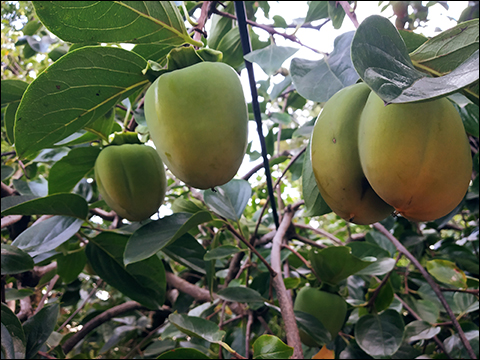Fruits and vegetables play a crucial role in maintaining the human health due to their health promoting potentials. Among them, persimmon is the nutritious fruit having strong anti-oxidant property.
Persimmon is an orange coloured fruit known for its sweet flavour. This wonder fruit is attributed with many qualities. Among its 400 different types of species, Fayu and Hachiya varieties are quite popular.

Persimmon is a fleshy fruit which belongs to Ebenaceae family. It is mainly cultivated in countries like Japan, Turkey, Brazil, China, Italy etc. In India these are found in some Himalaya region. Generally, over 400 species of persimmon are grown globally. They are eaten fresh or can be dried or cooked and used for making jams and jellies.
In European countries, persimmon is not cultivated but its demand is continuously increasing due to awareness regarding its hidden health benefits.
Persimmons are loaded with nutrients such as carbohydrates, proteins, Vitamin A, Vitamin C, Vitamin B6, Vitamin B1, Vitamin B2, folate, phosphorus, Vitamin K, Potassium, Copper, Manganese and Magnesium. The major types of phytochemicals in Persimmon fruit include carotenoids, tannins, phenolic compounds, proanthocyanidins and catechins. The B-complex vitamins act as co-enzymes for numerous metabolic enzymatic functions of the body.
Health and Nutrition Benefits of Persimmon
1. Protects from Cancer
Due to the presence of carotenoids and catechins, persimmon gives protection against cancer. These phytochemicals have anti-cancer perspectives against various cancer cell lines. The presence of anthocyanidins resembles to other flavonoids which have anti-oxidant properties.
2. Cardiovascular Health
Coronary Heart Diseases (CHD) are a major reason for human morbidity and mortality. Heart diseases such as atherosclerosis imbalances the lipid profile and causes high blood pressure as well. Therefore, diets which are naturally rich in anti-oxidants are in demand all over the world. Persimmon fruit is one among the nutritious fruits that has hypocholesterolemic effects as well due to the presence of bio-active compounds. In some of the countries, persimmon leaves are also used in tea formulations for the treatment of hypertension.
3. Provides Protection Against DNA Damage
To maintain a natural balance between reactive oxygen species (ROS) and antioxidant defence system, supplementation of anti-oxidants is necessary and nature has bestowed persimmon fruit with bio-active molecules, tannins, flavonoids and phenolic compounds. The function of bio-active molecules, tannins, flavonoids and phenolic compounds is to scavenge free radicals and inhibit the peroxidation of lipids.
4. Helpful in Diabetes Mellitus
Diabetes mellitus is characterized by improper glucose transport in the body. Now a days, drug therapies are losing their potential and natural products are gaining attention its treatment. Persimmon is one such fruit which plays an imperative role in the prevention and management of diabetes mellitus. Its leaves also have a therapeutic potential against diabetes as they inhibit the enzyme that converts carbohydrates into glucose. The complications of diabetes are also controlled due to the anti-oxidant effects. Unripe are suggested to have in diabetics patients.
5. Effective in Arthritis
As persimmons are an excellent source of Vitamin C, they are considered as natural anti-inflammatory agents. Arthritis is an inflammatory condition of the joints and this fruit helps in fighting arthritis effectively due to Vitamin C content. Vitamin C helps to protect the cells from the damage caused by free radicals in the body.
6. Anti-Bacterial Action
Persimmons are a rich source of tannins which show anti-bacterial property such as they are effective against bacteria such as E. coli. This fruit also inhibits the adherence of bacteria in mouth thus prevents tooth decay and maintains dental hygiene as well.
7. Good for Digestion and Anti-Haemorrhoid
Persimmons are a rich source of fiber. Fiber is essential for bowel movements. Regular use of persimmon fruit is helpful in regulating bowel movements and provides relief in intestinal issues. It also reduces the effect of toxic materials and protects the liver. On the other hand, tannins present in persimmons are responsible for its astringent taste. Due to its astringent property, it is considered as anti-haemorrhoid and controls excessive bleeding.
Tips to Remember
- Naturally grown fruits are always better than genetically modified fruits as fresher the fruit, richer is the bio-flavonoid content.
- Fruit is always better than fruit juice.
- Fruits should not be combined with other foods as this combination causes difficulty in digestion and the fruit stays in stomach for longer time.
Disclaimer:-
This article is not a substitute to the standard Medical Diagnosis or personalized Ayurvedic Treatment! It is intended only for Information!
For experts consultation, please write us at care@blessayurveda.com or click here to book appointment to consult online.
1,476 total views, 2 views today